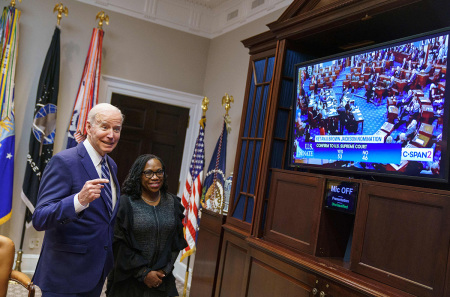Senate confirms Ketanji Brown Jackson as first black female Supreme Court justice

The United States Senate has voted to confirm Judge Ketanji Brown Jackson to the U.S. Supreme Court, the first African American woman to get a seat on the highest court in the nation.
Senators voted 53-47 on Thursday to confirm Jackson, who at present sits on the U.S. Court of Appeals for the District of Columbia Circuit. She is expected to join the court later this year.
Jackson will eventually replace Supreme Court Justice Stephen Breyer, who she once clerked for, when he retires at the end of the current session, which will end sometime this summer.
The vote was largely along party lines, though Republican Sens. Mitt Romney of Utah, Lisa Murkowski of Alaska, and Susan Collins of Maine joined 50 Democrat senators to support the nomination.
In a statement released in response to the vote, the Democratic National Committee said that “history has been made” with Jackson's confirmation.
“The court would greatly benefit from the insight of a black woman, a public defender, a judge who has served at the district and appellate levels and clerked at the Supreme Court. It is staggering that Judge Jackson embodies all those perspectives and more,” the DNC said.
“Judge Jackson has shown girls — especially girls of color — how big they can dream and just how profound an impact they can have on our nation. Her story is uniquely American. She represents the best of us and our shared values.”
In a statement emailed to supporters, Republican National Committee Chairwoman Ronna McDaniel denounced Jackson as an activist who would advance a radical agenda.
“Biden’s pick Ketanji Brown Jackson is a radical, activist judge, one who failed to answer simple questions on her record, including leniency for child porn offenders and support of CRT,” stated McDaniel.
“Jackson has proved to be in lockstep with the far left’s political agenda, even refusing to define what a woman is. The RNC will hold Democrats accountable this November for supporting Biden’s radical pick.”
In February, President Joe Biden announced his nomination of Jackson to fill the soon to be vacated seat of Breyer, honoring a 2020 campaign promise he made to nominate a woman of color to the Supreme Court if given the opportunity.
“Judge Jackson has broad experience across the legal profession — as a federal appellate judge, a federal district court judge, a member of the U.S. Sentencing Commission, an attorney in private practice, and as a federal public defender,” the White House noted in a statement at the time.
“Judge Jackson has been confirmed by the Senate with votes from Republicans as well as Democrats three times … [Jackson is] an exceptionally qualified nominee as well as a historic nominee, and the Senate should move forward with a fair and timely hearing and confirmation.”
During lengthy hearings before the Senate Judiciary Committee, Republicans grilled Jackson on her record of apparent leniency toward sentencing sex offenders and whether her decisions would be guided by Critical Race Theory.
At one point, Jackson garnered much mockery when Republican Sen. Marsha Blackburn of Tennessee asked her to define a woman, and Jackson responded by saying that she could not “in this context,” adding “I’m not a biologist.”
The Judiciary Committee, comprised of 11 Democrats and 11 Republicans, deadlocked on advancing Jackson’s nomination to the full Senate, failing to give her a favorable recommendation.
Nevertheless, her nomination went to the full Senate, with all Democrats and three Republicans announcing in advance their intentions to vote in favor of confirmation.





















